Text









How to Tell Time
In Italian, telling time is slightly different than how it’s done in English. For starters, to ask for the time, you’d essentially say, “What hour is it/are they?” and answer “It is the [number]/They are the [number],” where the word the stands in for “the hour(s).” So, you would ask “Che ora è?/Che ore sono?” and someone would respond “È l’una” or “Sono le quattro e venti.” The two questions are interchangeable, but the answer does depend on the time. È is only used with noon (È mezzogiorno), midnight (È mezzanotte), and one o’clock (È l’una). Sono is used with all other hours. To express minutes after the hour, just add e and the number of minutes (Sono le undici e dieci = It’s 11:10). You can also use e un quarto (:15), e mezzo (:30), and [an hour] meno un quarto (:45). To denote the time of day, simply add di mattina (in the morning), del pomeriggio (in the afternoon), di sera (in the evening), or di notte (in the nighttime). Just keep in mind that the Italians keep time a little differently than Americans do; for instance, sera might begin around 2:00 or 3:00 pm in some regions! To avoid this confusion, simply use the 24-hour clock. To ask at what time something begins, add the preposition a to the beginning of the aforementioned questions. For example, you might ask someone at what time your Italian lesson begins: “A che ora è la lezione d’italiano?” The speaker would respond, “È alle 3 e mezzo” (“It’s at 3:30”). He or she might even say, “È dalle 3 e mezzo alle 4 e un quarto” (“It’s from 3:30 to 4:15”). Review articulated prepositions (lesson 8) to write out your weekly schedule using da and a
14 notes
·
View notes
Text
Angelic Italian Words and Phrases

angelo (n.): angel
cielo (n.): sky, heavens
illuminare (v.): to illuminate, to light up
iridescente (adj.): iridescent; shining or glittering with the colors of the rainbow
nuvola (n.): cloud
raggio di sole: sunbeam, ray of sunlight
dorato (adj.): golden
aureola (n.): halo
tenero (adj.): tender, soft
puro (adj.): pure
toccare il cielo con un dito: to be ecstatic (literally: “to touch heaven with a finger”)
angelo custode: guardian angel
arpa (n.): harp
brillare (v.): to shine, to glow, to sparkle
paradisiaco (adj): heavenly, paradisiacal
133 notes
·
View notes
Link
Parlo català/italiano è un insieme di materiali ideati per capire e imparare il catalano o l’italiano a livello principiante, in modo facile e veloce. È pensato perché gli italiani imparino il catalano e i catalani l’italiano, a partire dal confronto tra le due lingue. I testi e i dialoghi sono stati registrati da persone madrelingua perché gli studenti possano apprezzare la pronuncia della lingua che stanno studiando. Il materiale è composto da 7 unità, in cui le pagine pari contengono il testo in catalano e i commenti (di lessico, di pronuncia, di grammatica o di cultura) in italiano, mentre nelle pagine dispari avviene il contrario: il testo è in italiano e i commenti in catalano.
Parlo català/italiano és un material ideal per entendre i aprendre a parlar català o italià bàsic d’una manera fàcil i senzilla. Està pensat perquè un italià aprengui català i un català, italià, a partir de la comparació entre les dues llengües. Els textos i diàlegs estan enregistrats per una persona nativa perquè els aprenents puguin tenir un referent auditiu de la llengua que estudia. Consta de 7 unitats en què les pàgines amb número parell sempre tenen el text en català i els comentaris sobre el lèxic, la pronúncia, les qüestions gramaticals o culturals més rellevants en italià, mentre que les senars és a la inversa, el text és en italià i els comentaris en català.
58 notes
·
View notes
Note
Do you remember, in a how to learn language post, you mentioned psychological barriers to learning. I'm really interested in that because it's something I struggle with. Could you give me some sources from where I could read about these and how to overcome them?
motivation psychology in language learning
language diary's tip
science journal: the 4 types of motivation
how do we acquire language? a speech
i'm a lazy language learner and that's fine
scientific study tips video
lazy ways of learning
making it easier
reasons to learn
on efficiency
on goals
and, caro's tip: as a passion project, create a tumblr blog in a fandom of your choice that speaks the target language. or go down the youtube rabbit hole of a foreign fandom you immensely care about. 1000% success rate because you bypass learning blocks inside your head and transfer motivation from productivity to understanding which is times stronger. also brings you extra close to real-life language use and slang you'd otherwise never learn.
1K notes
·
View notes
Text
youtube
Luglio | Riccardo Del Turco
Luglio, col bene che ti voglio
July, with the love I feel for you
Vedrai non finirà
Won't end you'll see
Luglio m'ha fatto una promessa
July made a promise to me
L'amore porterà
It will bring love
Anche tu, in riva al mare
You too, on the shoreline
Tempo fa, amore, amore
Time ago, love, love
Mi dicevi "luglio ci porterà fortuna"
were saying to me "July will bring us luck"
Poi non ti ho vista più
Then I haven't seen you anymore
Vieni, da me c'è tanto sole
Come, there's so much sun here
Ma ho tanto freddo al cuore
but my heart is so cold
Se tu non sei con me
if you're not with me
Luglio si veste di novembre
July will dress up as november
Se non arrivi tu
if you're not coming
Luglio sarebbe un grosso sbaglio
July it would be a huge mistake
Non rivedersi più
not to see each other again
Ma perché in riva al mare
But why on the shoreline
Non ci sei, amore, amore
you're not there, love, love
Ma perché non torni
but why you aren't coming back
È luglio da tre giorni
it's been July since three days
E ancora non sei qui
and you're still not here
Vieni, da me c'è tanto sole
Come, there's so much sun here
Ma ho tanto freddo al cuore
but my heart is so cold
Se tu non sei con me
if you're not with me
Luglio, stamane al mio risveglio
July, this morning when I woke up
Non ci speravo più
I wasn't believing in anymore
Luglio, credevo ad un abbaglio
July, I thought I got dazzled
E invece ci sei tu
And instead there is you
Ci sei tu, in riva al mare
There's you, on the shoreline
Solo tu, amore, amore
Only you, love, love
E mi corri incontro
And you run towards me
Ti scusi del ritardo
You apologize for being late
Ma non mi importa più
But I don't care anymore
Luglio ha ritrovato il sole
July has found again its sun
Non ho più freddo al cuore
My heart is not cold anymore
Perché tu sei con me
Because you're with me
Ci sei tu, in riva al mare
There's you, on the shoreline
Solo tu, amore, amore
Only you, love, love
E mi corri incontro
And you run towards me
Ti scusi del ritardo
You apologize for being late
Ma non mi importa più
But I don't care anymore
Luglio ha ritrovato il sole
July has found again its sun
Non ho più freddo al cuore
My heart is not cold anymore
Perché tu sei con me
Because you're with me
32 notes
·
View notes
Text
𝓛𝓮𝓼𝓼𝓲𝓬𝓸 𝓭𝓮𝓲 𝓷𝓮𝓰𝓸𝔃𝓲

[photo by Heidi Fin from Unsplash]
Negozi e mestieri - Shops and jobs
il supermercato | the supermarket
il centro commerciale | the shopping mall
il panificio - il panettiere | bakery - baker
la cartolibreria | the stationer's that sells books as well
la cartoleria | the stationer's
la libreria - il libraio | the bookshop - bookseller
il barbiere | the barber('s)
il parrucchiere | the barber('s)/hairdresser('s)
il salone di bellezza | the beauty salon
la macelleria - il macellaio | the butcher shop - butcher
la farmacia - il farmacista | the pharmacy - pharmacist
il negozio di vestiti/di abbigliamento | the clothes shop
il fiorista/fioraio | the florist
l'agenzia immobiliare (f) - l'agente immobiliare | the real estate agency - real estate agent
il fruttivendolo | the fruiterer/fruitmonger
la drogheria - il droghiere | (little) grocery shop - grocer
la gioielleria - il gioielliere | the jeweller's shop - jeweller
l'edicola - l'edicolante/il giornalaio | the newsstand - newsagent
il chiosco | the kiosk/stall
la sartoria - il sarto | the tailor's shop - tailor
la pasticceria - il pasticc(i)ere | the cake shop - pastrymaker
il negozio di souvenir | the gift/souvenir shop
il vivaio - il vivaista | the nursery (for plants) - nursery man
il veterinario | the vet
il ferramenta | the ironmonger's shop
il negozio di alcolici | the liquor shop
il negozio per animali | the pet shop
il negozio di scarpe | the shoe shop
il tatuatore | the tattoo parlor/the tattoo artist
la tabaccheria/il tabacchi(no) - il tabaccaio | the tobacconist's - tobacconist
l'enoteca (f) | the wine shop
la lavanderia | the laundry
il lavasecco | the dry cleaner's shop
il negozio di seconda mano | second-hand shop/thrift shop
il negozio di elettronica | the electronics shop
il mercato | the market
Termini correlati - Related terms
il/la cliente | customer
il venditore | seller, monger
il proprietario | owner
il commesso | shop assistant
chiedere aiuto al commesso | ask the shop assistant for help
la cassa | cash desk
la fila/la coda | queue, line
aspettare | to wait
fare la fila | to queue, wait in line
comprare | to buy
vendere | to sell
pagare | to pay
con carta (di credito) | by card
in contanti | in cash
i soldi | money
la banconota | banknote
la moneta | coin
restituire | to return
il rimborso | refund
consigliare | to recommend, advise
dare un consiglio | to give advice
un articolo | an item
fare la spesa/(le) compere | to do the shopping
il gestore/manager | manager
usato/di seconda mano | used/second-hand
lo scontrino | receipt
lo scaffale | shelf
la vetrina | shop window
in vetrina | in the shop window
guardare le/delle/un po' di vetrine | window shopping
gli orari di apertura | opening hours
il bancone | counter
il banco (del pesce, del pane) | counter, stall
il reparto (animali, elettronica) | department
il sacchetto | bag
aperto (24 ore su 24) | open (24/7)
chiuso | closed
i saldi | sales
uno sconto (del 20%) | a (20%) discount
scontato (del 20%) | discounted (by 20%)
l'offerta | offer
in offerta | on offer
caro/costoso | expensive
a buon prezzo/a buon mercato/non caro | cheap
fare un pacchetto regalo | to make a gift package
l'IVA | VAT

[photo by Ed Robertson from Unsplash]
A little grammar
Italian formation of feminine nouns can be a bit tricky, but it's nothing impossible to learn and in the end it comes down to practise and listening to others speak. To avoid a long grammatical rant, this won't be treating plural nouns and the nouns will be divided into 2 main categories, the second of which is the most complicated.
Nomi di genere fisso - Nouns with fixed gender
The easiest of the two, nouns with fixed gender are always inanimate and they're either masculine or feminine. This rule is key when you encounter certain couples of nouns which have a false gender variation. Among these, the most common ones are:
il pianto - la pianta | the crying - the plant
il colpo - la colpa | the hit - the blame
il caso - la casa | the coincidence/affair - the house
but also some homophones like:
il lama - la lama | the llama - the blade
il fronte - la fronte | the front - the forehead
Esseri viventi - Living beings
This is the most complicated part as there are several rules that further divide the nouns in other categories. Here they'll be divided in 4 categories: nomi mobili, nomi indipendenti, nomi ambigenere, and nomi promiscui (o di genere promiscuo).
1. Nomi mobili - Mobile nouns
This nouns keep the same root but change their ending.
Noun endings in -o or -e are replaced by -a in the feminine, unless the noun is refers to a job or a title, then usually it's replaced by -essa.
The masculine form is still preferred when talking about jobs and titles that women have been able to obtain only recently (e.g. avvocato, architetto, ministro, sindaco, etc), while the feminine is used for jobs and titles they have been able to do for a long time (e.g. sarta, professoressa, senatrice, infermiera).
2. Nomi indipendenti - Independent nouns
These nouns have completely different forms in the masculine and feminine form. Examples of this are padre-madre, fratello-sorella, montone-pecora, etc. and there are no rules so you ought to study them by heart.
3. Nomi ambigenere - Common gender nouns
Certain nouns ending in -e and in -a, and nouns ending in -ante, -ista, -cida and -iatra don't change between masculine and feminine. The only way to distinguish the gender is by the associated article and/or adjective.
Examples of this are:
il/la nipote | grandchild/nibling
il/la collega | colleague
un/un'artista | an artist
un/un'omicida | a murderer
il/la pediatra | pediatrician
4. Nomi di genere promiscuo - Promiscuous gender
These are mostly animals (with the notable exception of gatto/gatto, cane*, lupo/lupa, leone/leonessa, gallo/gallina) and they have only one gender and only one article to refer to both sexes. To specify an animal's gender "maschio/femmina" is added after the noun or the formation "il maschio/la femmina di [animale]"
For example:
la tigre (maschio/femmina) | the tiger/tigress
il leopardo (maschio/femmina) | the leopard
il masschio/la femmina della rondine
il medico | the doctor
la spia | the spy
la guida | the guide
la guardia | the guard
[sources: masculine and feminine in Italian, formazione del femminile, "Il buon uso della parole - grammatica e lessico" by Elena Daina and Claudia Savigliano]
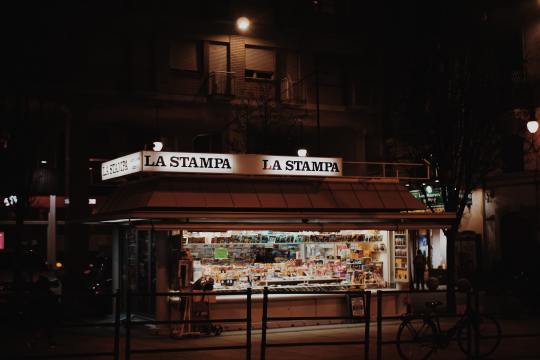
[photo: Italian Newsstand, by David Salamanca from Unsplash]
100 notes
·
View notes
Text

aries = ariete
taurus = toro
gemini = gemelli
cancer = cancro
leo = leone
virgo = vergine
libra = bilancia
scorpio = scorpione
sagittarius = sagittario
capricorn = capricorno
aquarius = aquario*
pisces = pesci
*(it should be without the "c", despite many write it anyway. But tbh acquario = fish tank/aquarium)
BONUS:
rising / ascendant = l'ascendente
constellation = la costellazione
- planets here
76 notes
·
View notes
Photo
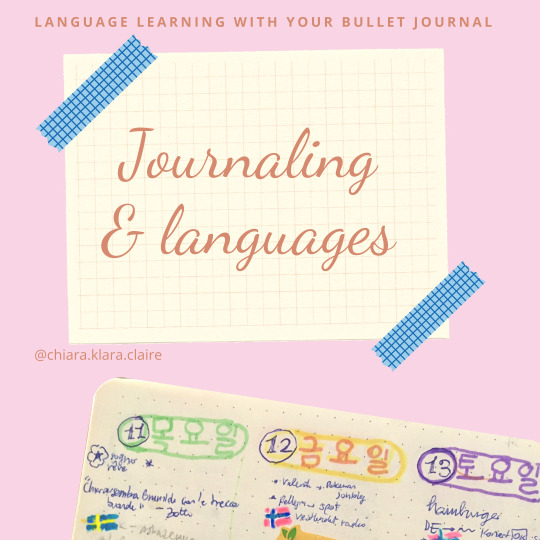
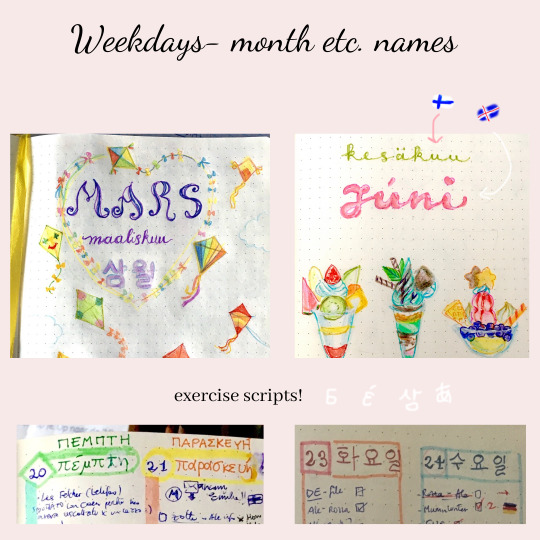
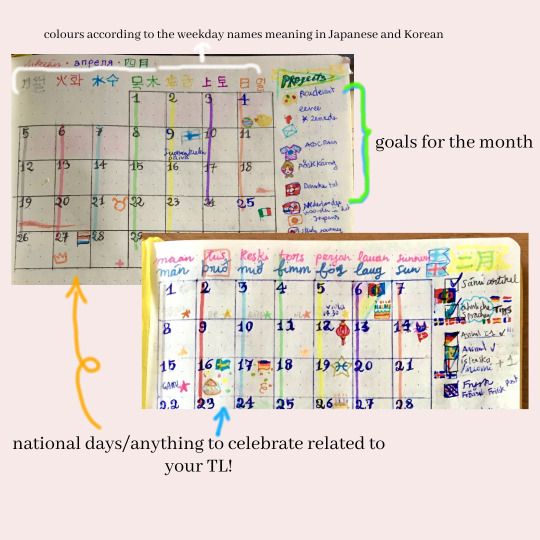
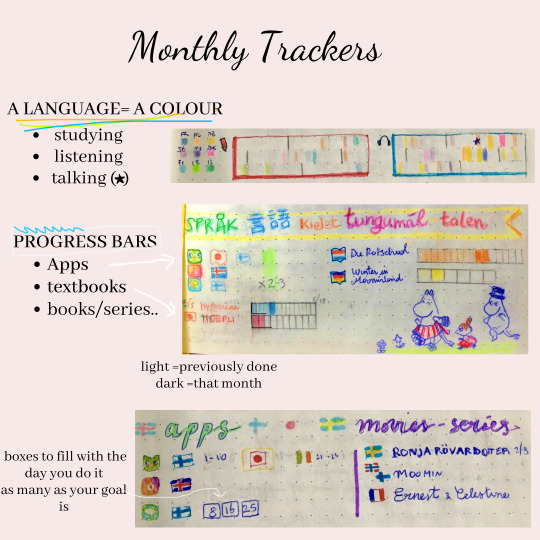
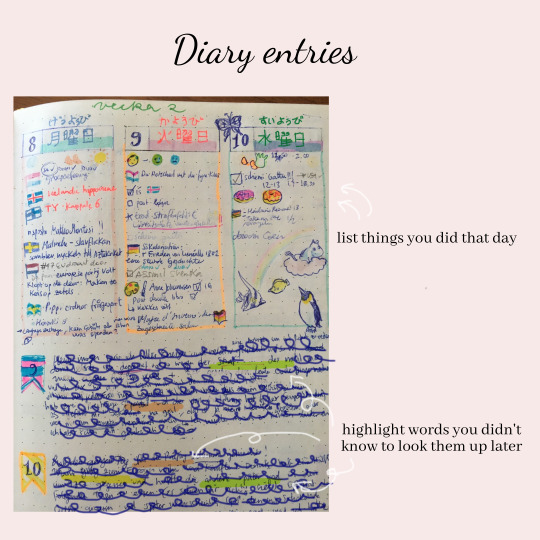
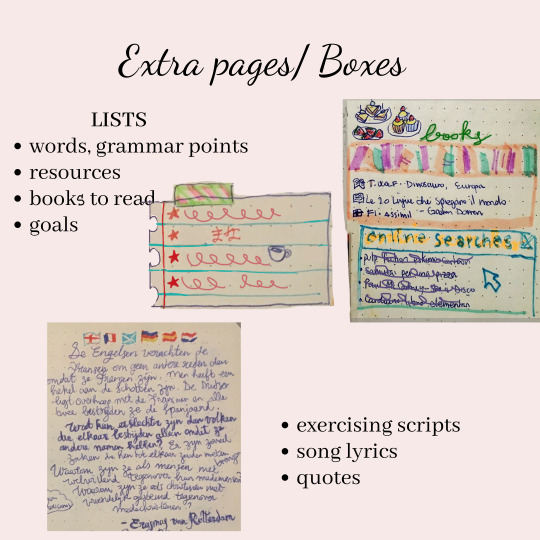
Ideas I developed for my Bullet Journal! My journal is not fully focused on languages but I tried to mix a personal diary with language learning
Hope it inspires you! IG: chiara.klara.claire
239 notes
·
View notes
Text

la frutta, i frutti - fruits
la mela - apple
la fragola - strawberry
l'ananas - pineapple
la pesca - peach
il limone - lemon
la prugna - plum
il lampone - raspberry
l'uva - grapes
l'anguria - watermelon
la melagrana - pomegranate
l'albicocca - apricot
la ciliegia - cherry
il kiwi - kiwi
la pera - pear
l'arancia - orange
la banana - banana
128 notes
·
View notes
Note
Hey! So I learnt Italian for years, from when I was about 5, but for the last few years I've neglected it. I want to start again so I was wondering if you had time if you knew any good Italian novels which might be good for an intermediate speaker? (That preferably avoid the passato remoto because 😨)
Hi 😊 I'm super happy to help, and very glad you know/study Italian!
Sorry if it took me a little while to answer, but I had to dig around a bit. Unfortunately passato remoto is THE narrative tense in Italian, and there aren't a huge number of novels that use presente or even passato prossimo, but I found some nonetheless!
Here they are, listed extremely loosely from easier to more complex (language-wise; themes vary wildly):
Cecilia va alla guerra, Lia Levi — ww1 from the perspective of a young girl
Zorro nella neve, Paola Zannoner — a snow rescue dog, and two teens who meet through their love for dogs
La repubblica delle farfalle, Matteo Corradini — kids and teens create a literary paper while held in the nazi camp of Terezin, in the Czech Republic
L'amore complicato, Paola Zannoner — a story about young (toxic) love
La gallina volante, Paola Mastrocola — work and quirks of a high school teacher with a passion for hen breeding
Io non ho paura, Niccolò Ammaniti — during a South Italian summer, young Michele finds a kid in a secluded hole in the ground
Bianca come il latte, rossa come il sangue, Alessandro D'Avenia — a year in the life of a teenage boy, dealing with family, school, first love, and tragedy
Tutte le mie preghiere guardano verso ovest, Paolo Cognetti — a memoir about the author's life in NYC
Tentativi di botanica degli affetti, Beatrice Masini — life in the Lombardy house of a famous poet in the early 1800s, told through the eyes of a young female artist employed by the family
Then there are these 3 series of crime novels (of which I'm listing the first book), all with a fun and smart female MC:
L'allieva, Alessia Gazzola — a newly-graduated medical examiner gets swept up in the investigations (and by the chief) of her lab
L'imprevedibile piano della scrittrice senza nome, Alice Basso — a very observant ghost writer juggles literary work and the investigation the police asked her for help with
Il morso della vipera, Alice Basso — a young woman in 1935 Turin lands a new job... and a role in an anti-fascist conspiracy
Lastly, if you want to challenge yourself with something quite more literary (with a bit of dialect thrown in, too), I suggest:
Ciò che inferno non è, Alessandro D'Avenia — a teen grows up in 1990s Palermo, mainly thanks to the example of one of his teachers, anti-mafia priest (and future Blessed) Pino Puglisi
Il sentiero dei nidi di ragno, Italo Calvino — ww2 anti-fascist Resistance in Central Italy through the naive, fantasy-prone eyes of a kid who joins a Brigata Partigiana
I'm sure there are many other books, but I've read these ones and I can vouch for their quality. Let me know if you find something to your liking! 😊
29 notes
·
View notes
Text
Addirittura - meanings

Certo, copio e incollo la tua submission qui @coolmevrouwtje, così mi è più facile fare un post veloce e spiegarti come usare la parola “addirittura”.
…davvero la consideri addirittura bella? - Do you really consider it to be even beautiful?
This is just an example ;) , but I’m going to write down a better explanation (hopefully), as the meanings sometimes might seem pretty similar and it’s not so easy to explain them all:
Addirittura is an adverb and it can be used in a few ways:
1) As in the example I wrote before, it means “even” (perfino); it works mostly as an interjection and it stresses how extraordinary can be a fact, a condition, a quality:
E’ andata addirittura dal medico per un raffreddore! - She even went to the doctor for just a cold!
Sì dimenticò addirittura di salutarlo - She even forgot to greet him.
Dovrai aspettare un po’ di giorni se non addirittura settimane - You’ll have to wait a few days if not/even several weeks
Non solo ha vinto la gara, ha addirittura battuto il record del mondo - He not only won the race, he even beat the world record
Si è addirittura sentito il colpo da qui - We even heard the blow from here
2) It might also mean: “completely, definitely, absolutely” (assolutamente, completamente), and, as above, it works as an interjection used to stress a fact:
Un simile atteggiamento è addirittura inconcepibile - Such an attitude is absolutely inconceivable
Sei addirittura esagerato - You’re completely overreacting
3) Meaning “even, really” (nientedimeno che), especially as an emphatic response or in an ironic way:
“Non gli parlerò più!” “Addirittura!” - “I won’t ever speak to him again!” “Oh, come on!”
”Ho dovuto pagare una bella somma” “Addirittura!” - “I had to pay a lot” “Really??!!”
“Tra gli invitati alla festa di Giovanni c'era anche (addirittura) il sindaco” “Addirittura!” - “Among the guests at Giovanni’s party, there was (even) the mayor” “You’re kidding me!”
“Nessuno sa dire la mia età con esattezza, mi danno al massimo 18 anni” “Addirittura!” - Nobody can exactly tell my correct age, they say I look 18″ “No way!/Really?!/As young as that!/Get away with you/Come off with it/You’re kidding me/You don’t say!”
“Ieri ho bevuto 7 birre” “Addirittura!” - “Yesterday I had 7 beers” “As many as that!/You don’t say!Really?!”
In this context, it is used with a few meanings according to the tone/feeling you want to express, as I tried to show especially in the latest examples. They generally can be summed up as the following ones (and closer ones):
- “Really? / Seriously? / Ah, don’t say so!”
- “Is that so?” (more indignant/scornful)
- “You’re joking / You’re kidding me” (more surprised/informal)
4) Meaning “straight away” (direttamente):
Non si è limitato a telefonare, è venuto qui addirittura - He didn’t just phone, he came here straight away.
5) Meaning “long ago, as far back as” and referring to something that happened back in the past, as a time complement (complemento di tempo):
Queste pitture rupestri sembra risalgano addirittura a 17′000 anni fa. - These cave paintings are believed to date as far back as 17′000 years.
I hope I made this clear enough (and that I haven’t forgot anything), if not let me know! Ciao
62 notes
·
View notes
Text
Just for fun, because I'm italian and I'm so excited for Luca-


Italo Calvino was a famous Italian writer, he wrote Il barone rampante (The baron in the trees), Il cavaliere inesistente (The Non-Existent Knight)... then I remembered that he also wrote a book of short stories entitled Marcovaldo.
Now we probably know where Giulia's (the red-haired girl) last name comes from.
Italo Calvino spent his childhood in Sanremo, on the Ligurian Riviera, choosen as the set for the movie (Portorosso doesn't exist, but it's based on Vernazza, Cinque Terre), in north-west Italy.
I live in the north-east, near Venice, and every region of Italy has its own peculiarities, so I can't say I know Liguria very well. But when I was younger I read some books by Calvino, and I just think this kind of details is nice. I would like to work in animation industry in the near future, and I'm so happy italian culture will have a good representation beyond stereotypes.❤️
Hope you find this interesting 😊
394 notes
·
View notes
Note
hi! do u have any advice on how to start learning languages? im never good at learning and im also too scared to just jump in aha. thanks!
Hello! Hope you’re well :)
This is a pretty cool question! And probably one that I’m not able to answer 100% accurately, but I can try.
I have grown up learning languages, so I have never really had a point where I ‘decided’ to start studying languages, so that’s why this might be a shot in the dark, but I hope it’s still helpful, at least a bit!
I think your fear of just jumping in is quite valid! Learning languages must seem like such a commitment and like something that you have to be serious about once you start doing it. Also, there are so many languages to choose from, each language with its own dialects, learning resources, a whole new world compacted into each language. But so cool that you want to start learning!
I think I’d definitely start with picking one. Sure, you could probably do some research about language learning itself, but it is very self-explanatory once you start! If you’re only just starting out I’d pick out a language based on following criteria:
1) it should be relatively easy - I’m not sure what your native language is, but try and pick a language that is relatively close to your first language. It doesn’t have to be necessarily similar, but it does make learning a bit more rewarding, when you’re not learning completely from scratch
2) you should like the language and get excited about it! - language learning can become a chore and it is a lot of work, so make sure that the language you’re picking is one that you like or really want to speak!
3) it should be useful to you in some way - now I say that as someone who’s learning mostly small languages, but I think your first foreign language should be a language that is going to be useful to you in some way. Whether you’re travelling to a country where it’s spoken or you want to consume media in that language, whether you have a friend or whether you want to start working in that language. I think that your first foreign language should have a lot of use in your everyday life, it makes it a lot easier and a lot more motivating to learn too!
Now none of these points are a ‘make it or break it’ kind of deal. If your native language is Spanish and you’re picking Welsh because you just like the sound of it, go for it! We won’t judge you at all! But you might probably have a bit of an easier time with say French or German. Also, remember that ‘bigger’ languages always have more resources for learners. I think that’s a quite crucial point when you’re just starting out, because you will need quite a bit of guidance.
After you’ve picked your language, I would maybe suggest just researching it for a bit before you jump in. Whether it’s here, on Reddit, a course, people you know who speak/learn the language. Get a bit familiar with what is out there - apps, books, courses, dialects, methods, teachers - I’m sure there’s loads out there to choose from. Obviously, if you’re starting in a course with a teacher - which is something that I would strongly recommend if you’re only just starting out - just let the course material be your initial guidance.
Your first few weeks might feel very overwhelming. Learning a completely new language is exciting, but it also makes you feel very estranged sometimes. You’re reading words, your brain doesn’t compute them at all. You literally have to ‘code’ your brain to process language in a different way than you’re used to from your native language. Don’t get discouraged though! It is one of the most rewarding hobbies that you can take up. Nothing amounts to the excitement of reading some random sentence somewhere and being able to understand it!
I’m sorry I went on for so long :D let me know if you have any more specific questions, I’d be happy to answer them! Again, I hope it wasn’t a complete shot in the dark. Good luck!!
12 notes
·
View notes
Text
🇮🇹 Persone, famiglia e amici 🇮🇹

Persone: People
Bebè: Baby
Bambina: Little Girl
Bambine: Little Girls
Bambino: Little Boy
Bambini: Little Boys
Ragazza: Girl
Ragazze: Girls
Ragazzo: Boy
Ragazzi: Boys
Donna: Woman
Donne: Women
Uomo: Man
Uomini: Men
Famiglia: Family
Bisnonno: Great-grandpa
Bisnonna: Great-grandma
Nonno: Grandpa
Nonna: Grandma
Padre: Father
Papà: Dad
Madre: Mother
Mamma: Mom
Genitori: Parents
Marito: Husband
Moglie: Wife
Figlio: Son
Figli: Sons
Figlia: Daughter
Figlie: Daughters
Fratello: Brother
Fratelli: Brothers
Sorella: Sister
Sorelle: Sisters
Nipote: Grandchild, Nephew, Niece
Nipoti: Grandkids, Nephews, Nieces
Suocero: Father-in-law
Suocera: Mother-in-law
Suoceri: Parents-in-law
Zio: Uncle
Zii: Uncles
Zia: Aunt
Zie: Aunts
Cugino: Cousin (m)
Cugini: Cousins (m. plural)
Cugina: Cousin (f)
Cugine: Cousins (f. plural)
Cognato: Brother-in-law
Cognati: Brothers-in-law
Cognata: Sister-in-law
Cognate: Sisters-in-law
Genero: Son-in-law
Generi: Sons-in-law
Nuora: Daughter-in-law
Nuore: Daughters-in-law
Patrigno: Stepfather
Matrigna: Stepmother
Padrino: Godfather
Madrina: Godmother
Amici: Friends
Amico: Friend (m)
Amici: Friends (m. plural)
Amica: Friend (f)
Amiche: Friends (f. plural)
Vicino: Neighbor (m)
Vicini: Neighbors (m. plural)
Vicina: Neighbor (f)
Vicine: Neighbors (f. plural)
Photo by Kristijan Arsov on Unsplash
342 notes
·
View notes
Text
Italian learners 🇮🇹
Ciao a tutt*! I’d like to recommend an Italian YouTube channel called “Canale di Venti” created by different people in their 20s for people in their 20s and aimed at sparking conversations via different formats (monologues, chats, book reviews, interviews) around topics like:
everyday life (taboos, relationships, university, etc.)
mental health
social issues
Here’s a hilarious vent about life during the pandemic a year after the outbreak:
youtube
And the latest book chat 📚:
youtube
“Avere vent'anni è difficile. Non si è più adolescenti, ma nemmeno adulti. Si impara a votare, a guidare, a lasciare le persone e a innamorarsi di nuove. Si va a convivere, si sbaglia, si fanno viaggi da soli e si studia parecchio.” (from their info page).
355 notes
·
View notes
Text
🇮🇹 I saluti 🇺🇸 Greetings
Ciao: Hi/Bye (Informal)
Salve: Hello (formal)
Buongiorno: Good morning
Buon pomeriggio: Good afternoon
Buonasera: Good evening/night (after 6 p.m/18hrs)
Buonnanotte: Good night (farewell)
Come sta?: How are you (formal)
Come stai?: How are you (informal)
Come state?: How are you? (plural)
Come va?: How’s it going?
(Va) Tutto bene?: Is everything going well?
Tutto a posto?: Everything okay?
Come butta?: What’s up? (slang)
Comme vanno le cose?: How things are going?
Sto bene: I’m good
Tutto bene: It’s all good
Così così: So-so
Non c’è male: Not that bad
Come ti chiami?: What’s your name?
Mi chiamo: My name is
Sono: I am
E tu?: And you?
Quanti anni hai?: How old are you?
Ho ____ anni: I’m _____ years old.
Da dove vieni?: Where you come from?
Vengo da… : I’m come from…
Di dove sei?: Where are you from?
Io sono di: I’m from…
Cosa fai nella vita?: What do you do in life/for living?
Mi occupo di: I work on…
Mi dedico a: I dedicate myself to…
Che cosa ti piace fare?: What do you like to do?
Mi piace…: I like…
Quali sono i tuoi hobby?: What are your hobbies?
Miei hobby sono…: My hobbies are…
Piacere di conoscerti: Nice to meet you
Anche me / Anch'io: Me too
il piacere è mio / Piacere mio: The pleasure is mine / My pleasure
A presto: See you soon
Ci vediamo dopo: I’ll see you later
Arrivederci: Goodbye (formal)
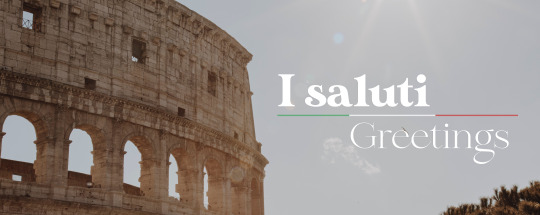
Photo by Simona Sergi on Unsplash
684 notes
·
View notes
